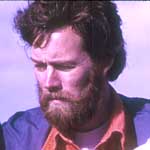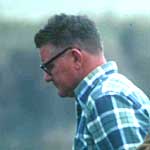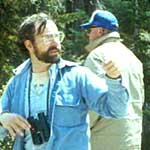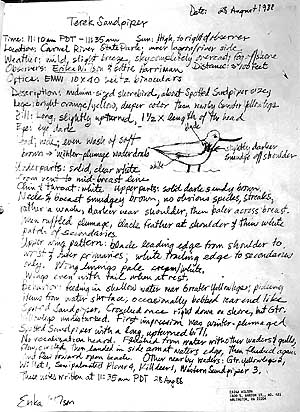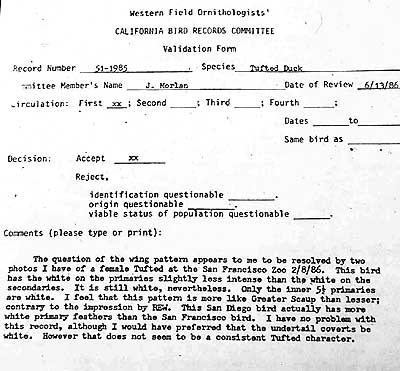| The California Bird Records Committee (CBRC) was established
in 1970 to review sight records of rare birds in California (Calif.
Birds 1: 2-3). It was patterned after successfully operating rarities
committees in Europe, primarily the British Birds Rarities Committee in
Britain (Calif. Birds 2: 109-110). Those appointed to the first
CBRC as the "ten rare men" were: Laurence C. Binford, Eugene Cardiff, Ted
Chandik, Alan Craig, Dave DeSante, Pierre Devillers, Cliff Lyons, Guy McCaskie,
Shum Suffel, and Jon Winter (secretary). Throughout the next 19 years within
our survey period (1971-1989), it operated more or less consistently with
the same basic procedures. The Secretary did the heaviest work: compiling
descriptions sent by observers to the Committee, packaging them for circulation,
tallying votes of members as they were mailed in, and chairing the annual
meeting. For the first 7 years, the same 10 members reviewed records, except
when members resigned. Pierre Devillers moved out of state after 1971 and
Rich Stallcup took his place.
In 1978, the Committee adopted a term-limit system: members were elected
to 3 year terms and after two such terms, were required to take at least
a year's vacation from Committee work. The Secretary, however, had single-year
terms and there was an election for Secretary each year [in practice, the
Secretary was automatically re-elected until he was worn out and stepped
down]. In the quarter-century under review in this web project, four people
served as CBRC secretary: each one served 4-6 years. They were:
Eventually, the CBRC would evolve to a system that included a non-voting Secretary. A Chairman and Vice-chairman are currently (2005) chosen from among the CBRC membership to handle some of the tasks formerly done by the Secretary, but all of this was after the period under review here. In practical terms, during the first two-plus decades of the CBRC, the Secretary served in both that position and that of Chairman. A total of 28 observers served as voting CBRC members between 1971-1989. These were, ranked in terms of years served during this period:
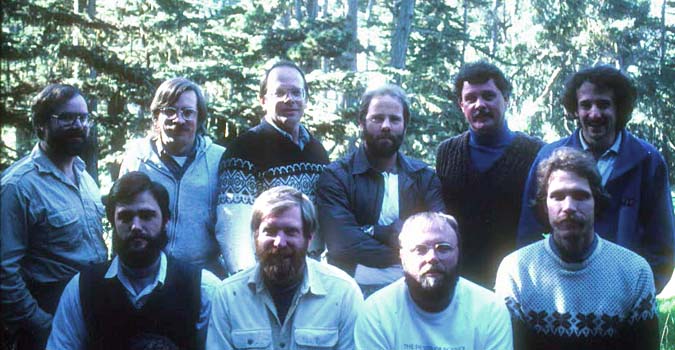 |
|||||||||
| One might note that all the above 28 members were men (and thus the
term "the ten rare men"). This would change in 1993 when Shawneen E. Finnegan
was elected as the first female CBRC member.
Formal bylaws govern procedure; there is an annual meeting to elect new members, amend bylaws, and deal with particularly controversial records. Throughout its history the ten members reviewed and voted on documentation through a mail circulation process. Documentation may appear in various forms: photographs, videotapes, tape-recordings, field sketches, and written descriptions. Members then vote on standard forms, often explaining the reasons for their vote. The examples shown below are the field notes & sketch of California's first Terek Sandpiper (by Erika Wilson in Aug 1988; left) and a CBRC member's vote, this on a San Diego County record of Tufted Duck (by Joe Morlan in June 1986, right).
|
|||||||||
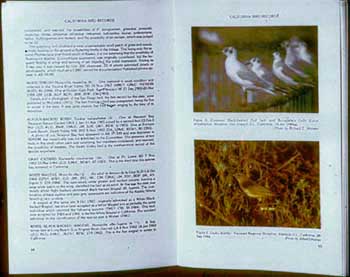 CBRC
reports have always been published in California Birds or its successor,
Western
Birds(right, portion of the 9th CBRC report [Roberson 1986;
W.
Birds 17:49-77]). Initially, the Secretary wrote the published CBRC
reports but this had changed by 1979 when co-authors were added , and eventually
writing an annual CBRC report became a task that was passed around among
the CBRC members. CBRC
reports have always been published in California Birds or its successor,
Western
Birds(right, portion of the 9th CBRC report [Roberson 1986;
W.
Birds 17:49-77]). Initially, the Secretary wrote the published CBRC
reports but this had changed by 1979 when co-authors were added , and eventually
writing an annual CBRC report became a task that was passed around among
the CBRC members.
Interesting records may circulate up to 3 times and then be determined at an annual meeting, but most records that are accepted are approved during the first circulation. Although initially targeting only sight records, by the 1980s the CBRC was evaluating all claims of California rarities, including specimens. This required visits to all relevant museums and photographing the specimens for review, as well as obtaining necessary measurements. In the late 1980s, the CBRC undertook an "old records review" project in an attempt to review all records of birds on the CBRC review list, even those many years old. An amazing number of written descriptions were located in old field notes, and by the end of the project, some 92% of all current and historic reports of California rarities had been reviewed. The CBRC is currently (2005) in the process of publishing a book on its first 3+ decades of operation and decisions. |
